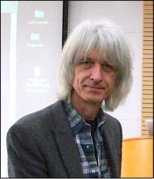
dr. norman macleod received a bsc from the (geology, 1975), msc from (paleontology, 1978) and phd from the (micropaleontology, 1986) and has held postdoctoral positions at the (1986–1989) and (1989–1993). he was formerly a researcher (1993–1999; 2016–2019), dean of postgraduate education & training (2013-2016), keeper of palaeontology (2000–2013), and associate keeper of paleontology (1999) at . dr. macleod has also been an honorary professor in the department of earth sciences at and a visiting professor at the and the
to date prof. macleod has authored over 500 sci-listed publications, primarily in the areas of the quantitative analysis of organic form, extinctions research, quantitative stratigraphy and archeology, including contributions to micropaleontology, invertebrate paleontology, vertebrate paleontology, zoology, botany, taxonomy, systematics, stratigraphy, functional morphology, and artifact analysis. he is the author of nine books including edited collections of technical articles (, w. w. norton, 1996; , taylor & francis, 2002; , crc press, taylor & francis group, 2007 ), topical volumes (, cambridge, arts & humanities research council / crucible network, 2011; , the natural history museum, 2013; , wiley-blackwell, 2013; , scidinge press, 2014) and an encyclopedia (, gale-cengage, 2013)[1]. he was also the editor of the series (3 volumes) of electronic paleontological databases that were published blackwell science between 2000 and 2010. dr. macleod is currently writing a book on quantitative stratigraphic methods to be published by .
during the course of his career dr. macleod has been very active in encouraging the development of the life sciences in general and paleobiology in particular. in the run up to the millennium year he was responsible for development the natural history museum’s technical program of presentations, panel discussions and inter-institutional collaborations (e.g., , ) for the museum’s millennium celebrations and server on the organizing committee for the paleo21 conference (sponsored by the us national science foundation and eu and held in hamburg, germany) that brought representatives from academia, government, industry, professional societies and non-professional interest groups together to set out a developmental agenda for the field of paleontology in the 21st century. as a result of these activities dr. macleod founded the online communications system for paleontologists. paleonet is the largest system of its kind in the field of paleontology, is the only system that crosses the boundaries between the various types of paleontology (e.g., micropaleontology, invertebrate paleontology, vertebrate paleontology, paleobotany) and has become part of the discipline’s core infrastructure. in order to facilitate electronic publishing in paleontology dr. macleod also founded the world’s first online electronic paleontological journal, in 1998 and served as its founding executive editor from 1998 – 2002. dr. macleod has also served as an editorial board member of (2013–2019), (2013–2019), and was the co-chief editor of the chinese paleontological journal (2014 – 2019). in addition, dr. macleod has been interviewed by numerous media outlet, appeared on television and radio programs, and written articles for leading international newspapers, including the bbc (radio and tv), itv, the guardian, the times, the telegraph in the uk, national public radio in the us and the australian broadcasting service.
from 1986 to present dr. macleod has given hundreds of technical presentations, keynote presentations, research lectures, university course guest lectures and organized field trips at scientific conferences, universities, commercial organizations, literary festivals, and public communication of science fora worldwide. he has taught and/or served on the advisory committees of over 60 msc and phd students in addition post-doctoral seven post-doctoral researchers. through his research activities he has raised more than $2 million in research funding and, most recently, was awarded ¥1 million as the first nanjing university recipient of the prestigious 江苏双创 (jiangsu shuang chuang) talent award (2022–2026)
professor macleod has a wide range of research interests. he is perhaps best known for his work documenting patterns and understanding the causes of phanerozoic extinctions, especially the end-cretaceous mass extinction event where he is a leading proponent of the multiple-cause model. equal in terms of output and prominence is his theoretical, methodological, and applied work in the field of morphometrics where he was an early proponent of geometric morphometrics, pioneered development of the use of outline semilandmarks to characterize form and shape, the morphometric characterization of 3d surfaces, and most recently the application of computer vision and machine learning methods to the analysis of morphology. other research interests include macroevolution, evolutionary rates, quantitative biostratigraphy (esp. graphic correlation), applied statistics, and quantitative data analysis (esp. multivariate ordination, discriminant analysis, monte carlo simulation, bootstrapping, and jackknifing) and archeological artifact analysis. in addition to his scientific research dr. macleod has developed minor intellectual sidelines in art history (esp. with regard to scientific images) and the effect of evolutionary biology and climate change on human history.
at nanjing university dr. macleod teaches classes in extinctions, paleobiology, data analysis in the earth sciences, and entrepreneurship (see his ). his hobbies include music (listening, playing, composing), cooking, gardening (indoor/outdoor), chinese history/language and making/maintaining friendships. his is available online.
[1] awarded an honorable mention professional and scholarly excellence (prose) award: multivolume reference/science category in 2013 by the association of american publishers.